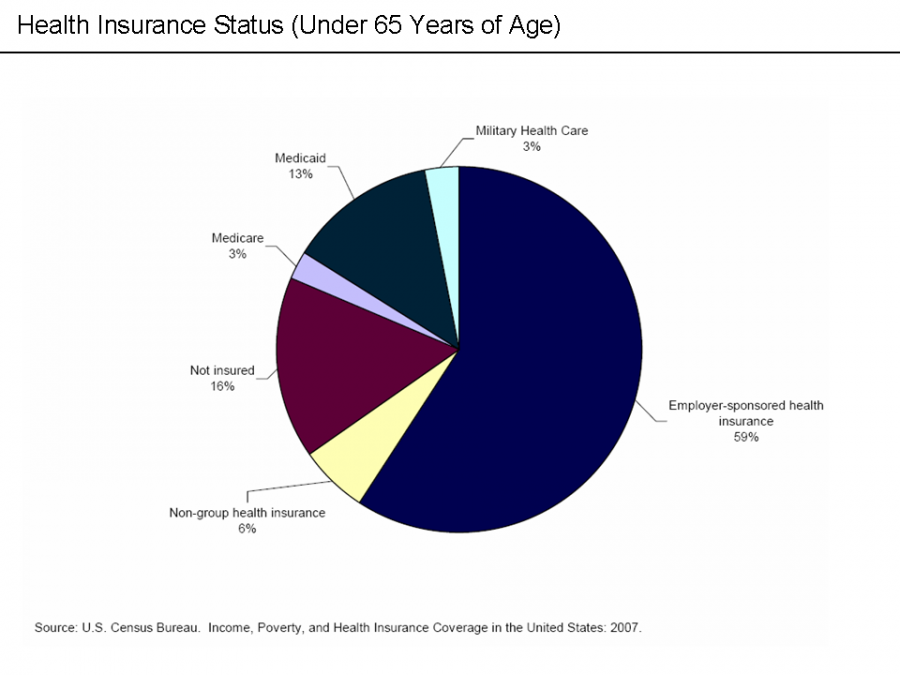Why the American Health Care System Needs Reform
The United States healthcare system is very different from most industrialized and developed countries, and does not have a uniform structure or universal coverage. To put it simply, healthcare should be considered a human right, and the American government must provide for their citizens and make it easier and more affordable for the everyone to have access to healthcare.
“My biggest issue with [the American healthcare system is] that you have the most expensive healthcare system in the world that fails to provide care for everybody,” social studies teacher Mr. Troy Ruch said. “It’s extremely inefficient.”
“I feel that hospitals are overcharging [patients] directly because they know insurance [companies] will pay certain amounts [of money,] so they charge a lot more,” senior Allie Jameson said. “Consumers get left with ridiculous bills. I feel that the cost is not letting those who need access to healthcare access it.”
The 2010 Patient Protection and Affordable Care Act (ACA), also known as “Obamacare,” established a shared responsibility between the government, insurers, and individuals in ensuring that all Americans have access to affordable and high quality healthcare. However, the Trump Administration has made multiple attempts to repeal this important legislation. Furthermore, the recent tax reform legislation includes a provision that eliminates the ACA’s mandate that most Americans must have health insurance.
While still flawed, Obamacare is a small step towards universal health insurance coverage. There are still many uninsured Americans, but the rate has gone down. In 2016, 27.3 million individuals went uninsured, representing eight percent of the population. In 2015, nine percent of the population was uninsured. This proves that the implementation of the ACA’s major coverage expansions in January 2014 has increased the population of insured persons. These reforms include the requirement that Americans must procure health insurance, the opening of the health insurance marketplaces which offer premium subsidies to lower and middle-income individuals, and the expansion of Medicaid in many states to increase coverage for low-income adults.
Obamacare slows the rise of healthcare costs by providing insurance to a larger population of Americans and making preventive care free. It also requires insurance plans to cover the 10 essential health benefits: preventive and wellness visits, maternity and newborn care, mental and behavioral health treatment, services and devices to help those with injuries or disabilities, lab tests, pediatric care, prescription care, outpatient care, emergency room services, and hospitalization. Insurance companies also cannot deny an individual due to pre-existing conditions, which are health conditions that someone had before the date of coverage from a new healthcare provider. From a government spending perspective, Obamacare reduces the government’s healthcare costs, raises taxes on some businesses and higher-income families, and shifts cost burdens to healthcare providers and pharmacy companies.
“The American Healthcare system could definitely be improved,” administrative assistant of Northampton County Children Youth and Families Susan Blasco said. “As a country of wealth, we should be offering all our citizens some type of national care.” Part of Blasco’s job is to coordinate medical coverage for foster children in the Northampton County, which borders Lehigh County.
However, even with the ACA in place, the health insurance system is still corrupt. There are numerous private and public sources of health insurance and wide gaps in insured rates across the country. With the ACA, three to five million people lost their employment-based health insurance, and many insurance plans went out of business because their plans did not cover the ten required health benefits. The act also taxed those who did not purchase insurance, and four million people even chose to pay the tax rather than purchase insurance, rendering this action useless in incentivizing the purchase of health insurance. No matter how many benefits Obamacare provides, it still has not proven successful in drastically improving our problematic healthcare system.
“Looking into how insurance companies actually work and making sure that the money goes where it’s intended is another area for improvement,” Blasco said. “Pharmaceutical companies should be examined. [This] wouldn’t be so much a regulation issue if all businesses just did the right thing.”
According to 2016 data from the Best Countries rankings, Denmark has the best health care system in the world. The Danish people happily pay higher taxes in exchange for higher quality health care.
Switzerland is also known for its high quality healthcare system. There are no employer-sponsored or government-run insurance programs, so Swiss citizens purchase insurance for themselves. The government defines the minimum benefit package that is necessary, and they subsidize healthcare for the poor on a graduated basis with the goal of preventing individuals from spending more than ten percent of their income on insurance.
Additionally, 99.5 percent of Swiss citizens have some form of health insurance. Since they can choose plans from nearly 100 different private insurance companies, insurers must compete on price and service, which helps to curve healthcare inflation.
Switzerland and Denmark are only a few of the countries whose healthcare systems are much more affordable and beneficial to citizens than the United States’. It is known that the United States is one of the most wealthy and affluent countries in the world, so the healthcare system must improve. In such a developed country, the healthcare must be affordable and easily accessible to all citizens, as it is a basic human right.

Senior Izza Choudhry is a four-year staff reporter and former one-year copy editor and one-year news editor, now serving as opinion editor for the Spotlight....

Senior Kennah Salvo is the features editor and a third-year staff reporter and former news editor for the Spotlight. She is a member of the Feminist Student...


